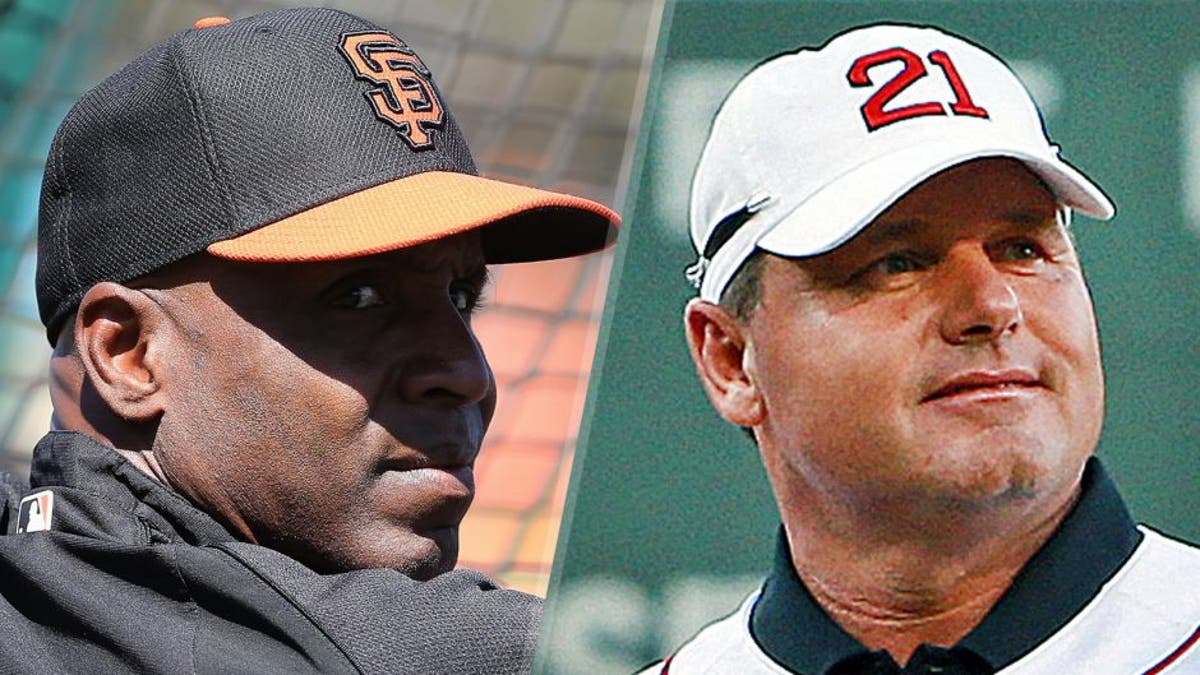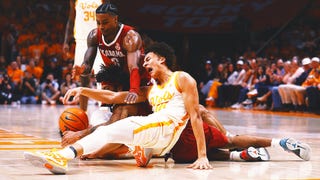
Barry Bonds of the San Francisco Giants watches batting practice before the spring training game against the Oakland Athletics at Scottsdale Stadium on March 15, 2014 in Scottsdale, Arizona. (Photo by Christian Petersen/Getty Images) Before the game, the Red Sox honored former manager Joe Morgan (not pictured) on the occasion of the 25th anniversary of 'Morgan Magic'. Players from the 1988 team were on hand for a pre-game ceremony, including Roger Clemens, who places his hand to his chest as the crowd cheers when he was introduced. The Boston Red Sox hosted the Seattle Mariners in an MLB regular season baseball game at Fenway Park. (Photo by Jim Davis/The Boston Globe via Getty Images)
Two odd things about landslide Hall of Famer Junior Griffey: Career-wise, he probably was not a good fielder; and (in related news) he really wasn't a good player for the last decade of his career. Of course, he was so brilliant for the first dozen years of his career that he's an exceptionally easy choice for the Hall of Fame voter.
Yes, I know that three voters didn't vote for Griffey. If you're offended by this, I'm tempted to offer this advice: "Get over it." But I don't think that advice is often useful, so I will reserve it for those of you who are not Mariners fans. If you are a Mariners fan, I'll say this instead: Nurse that outrage. Let it percolate inside your mind and your gut, and allow it to spoil what should be a glorious day in your baseball life. That's just a LOT more fun than focusing on the fact that Griffey's percentage is a new record.
Piazza's an easy choice, too. Notwithstanding that pesky backne, anyway. Griffey ranks sixth all-time among center fielders in fWAR; well, Piazza ranks sixth among catchers. And that's without any points for pitch-framing, while we've got some evidence that he was actually pretty good behind the plate. I'm far from the biggest Piazza fan in the world -- I still harbor some doubts about his defense, his period of greatness wasn't particularly long, and I found his memoir off-putting -- but the numbers don't lie, man. We're talking about the best-hitting catcher in the history of ever.
Of course, even with all the tremendous candidates on the ballot, Griffey and Piazza were the only ones to clear the necessary 75 percent.
But there's plenty of hope for Jeff Bagwell (72 percent) and Tim Raines (70) and rookie Trevor Hoffman (67).
Granted, it's highly unlikely that all three of them will be elected next year, simply because it's difficult for four players to be elected at once, and Ivan Rodriguez joins the ballot next year. I don't expect Rodriguez to get elected on his first try, but he'll certainly suck up a large number of votes. Vladimir Guerrero will pick up a few, too.
Enough to keep out Bagwell and Raines? Probably not. Raines is practically a lock, as being in his last year of eligibility will focus the attention and the analysis, which can only help him (he reached base more times in his career than Tony Gwynn, just in case you haven't heard). And Bagwell fell only 15 votes short of election this time around; it's hard to imagine the presence of Pudge keeping Bagwell from those 15 votes.
Hoffman, though? He's the one who's likely to suffer. Because frankly, his statistical case isn't a great one -- you know, aside from all those saves -- so he's simply easier to leave off your ballot, if you're hitting your limit (as so many voters do these days).
Aside from first-timers Griffey and Hoffman, the remaining serious candidates all essentially moved way up from last year. Piazza went up 13 percent, Raines and Bagwell 15 and 17 percent, Edgar Martinez and Curt Schilling 13 and 16 percent. Mike Mussina, more than 18 percent!
Part of this is due to the sensible culling of the voter rolls, but (I think) most is simply because Randy Johnson, Pedro Martinez, John Smoltz and Craig Biggio weren't on the ballot this year.
Roger Clemens and Barry Bonds both ticked up some this year, too. But as Ken Rosenthal writes, their increases are largely a mirage, which is obvious when you compare their improvements to those of the other guys. Still, Clemens and Bonds did finish seventh and eighth, or fifth and sixth among the non-winners. What's more, Rosenthal might be too modest. While Clemens' and Bonds' increases might not be superficially impressive, things might change quickly now that Rosenthal and a few other influential writers have come around.*
* For years, Rosenthal refused to vote for the supposed drug cheaters, while saying he was keeping an open mind. Well, now we've got proof of the open mind.
With Rosenthal and so many other leading lights -- ESPN's Tim Kurkjian and Jayson Stark and Jerry Crasnick and Jim Caple; Jeff Passan and Joe Posnanski and Joel Sherman; Bob Nightengale and Tracy Ringolsby -- pulling the levers for both Bonds and Clemens, it simply becomes easier for other voters to justify pulling those same levers. If you don't believe there's a snowball effect in play, just look at the progression for eventual Hall of Famers like Bert Blyleven, Jim Rice and so many, many more.
Does that mean Bonds and Clemens are going to make it?
Nobody can say. I think it'll be a close-run thing. I've always thought they would eventually be elected, if only because the Hall of Fame someday won't seem at all legitimate without them. But I was doubtful about the BBWAA electing them, and that was before their eligibility period was cut from 15 years to just 10.
But perspectives are shifting, positions changing. As Rosenthal points out, it's become a near-certainty that steroids users have already been elected to the Hall of Fame. And as this sinks in, more and more voters will be reluctant or unable to make that dubious distinction between the guys who everybody thinks used sports drugs and the guys who almost everybody thinks used them.
Maybe Bonds and Clemens will get a few more votes from year to year, but fail to reach 75 percent by their 10th years of eligibility. But maybe the dam will burst, and they'll jump from 45 percent this year to 55 or 60 next year, or the year after that. After which election becomes practically inevitable.
Let's be honest, friends. With multiple miracles of modern medicine already in the Hall, can they really keep out the most masterful miracles?








































